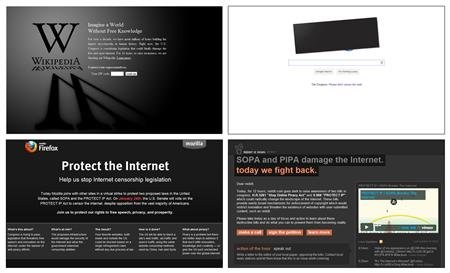If you tried to look something up on Wikipedia today, you may have been surprised to learn not about whatever obscure fact you were hunting down, but that there's a war being waged(发动) over what you can see on the Web. Two bills, Stop Online Piracy Act and Protect IP Act, are seeking to limit copyright infringement(侵犯) online, and the web is in revolt(反抗).
On Wednesday, Wikipedia (which blacked out its site) and Google, which visibly protested the legislation on its homepage, voicing their opposition (along with many other sites, including Yahoo!) to bills they argue would ruin the freewheeling(随心所欲的) world of the Internet. Media companies are in favor of the legislation, arguing that they need a way to stop illegal downloading and pirating of their material.
So what are these bills exactly?
The Stop Online Piracy Act (SOPA) is the House bill; Protect IP Act (PIPA) is its Senate sister. Both focus on foreign websites that pirate movies, music, and other materials from the U.S. (sites that many Americans use -- an industry study has noted that 17.5% of all bandwidth in the U.S. is taken up by illegal downloads.)
That may sound sensible, but many media companies operating online think the language is too vague in terms of defining what constitutes piracy; feel the bills don't define who is responsible for making sure illegal material from foreign sites isn't showing up on U.S. sites; and think the legislation imposes sanctions(制裁) that are too heavy-handed(严厉的).
Here's why: If passed, the bills would allow the owner of the material to seek court orders(法院指令) that would block access to the alleged(声称的) pirate site and require credit card companies and advertisers to stop payments to the site.
So how are law-breaking sites identified? SOPA defines a "foreign infringing site" as one that is "committing or infringing" on copyright. PIPA is more specific, describing sites that have "no significant use other than" copyright infringement. Websites would have 5 days to appeal.
Websites and media companies worry that they could be targeted for unknowingly hosting pirated material -- think of user-generated video uploaded on Facebook, Wikipedia, or Twitter.
SOPA would also make it illegal to stream unauthorized(未被授权的) content. This has been dubbed(把…称为) the "Free Bieber" provision(条款), since the baby-faced pop icon Justin Bieber got his start on YouTube performing music from other singers.
The Senate bill is losing sponsors who think the legislation goes too far. Voting on PIPA will begin on January 24.


